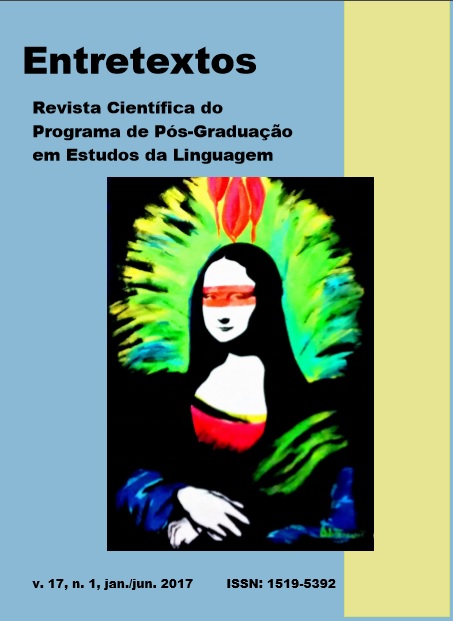Intensive concessive structures in spoken Spanish: a functional discourse point of view
DOI:
https://doi.org/10.5433/1519-5392.2017v17n1p37Keywords:
Concession, Spanish Language, Functional discourse grammarAbstract
In this article, we study the concessive constructions in peninsular spoken Spanish introduced by conjunctive locution, por mucho que in the light of Functional Discourse Grammar theory (HENGEVELD; MACKENZIE, 2008). It is intended to investigate in which level and layer proposed by this theory these constructions act. As investigation universe, we analyze surveys from PRESEEA Project according to the following criteria: levels and layers of acting, verbal tenses and moods of the clauses, ordering and prosodic marks. The results show that the clauses prefaced by such structures can act in the layer of the Discursive Acts, as a rhetorical function, or even in the Propositional Content layer as a semantic function. The recurrent use of new constructions in the language to express semantic notions such as concessivity, as in the case of Por mucho [N] que [N/pron] Vsubj (ROSARIO, 2014), can be explained by the fact that communicative needs lead the speakers to be specific through grammatical coding.Downloads
References
CREVELS, Mily. Concession in spanish. In: HANNAY, Mike; BOLKESTEIN, Alide Machtelt. Functional grammar and verbal interaction. Amsterdam: J. B. Publishing, 1998. v. 44, p. 129-148.
DANCYGIER, Barbara. Conditionals and predication: time knowledge and causation in conditional constructions. Cambridge: Cambridge University Press, 1998.
DANCYGIER, Barbara. Conditionals and Concessives. Papers and Studies in Contrastive Linguistics, n. 24, p. 111-121, 1988.
FLAMENCO GARCÍA, Luis. Las construcciones concesivas y adversativas. In: BOSQUE, Ignacio; DEMONTE, Violeta (Org.). Gramática descriptiva de la lengua española: entre la oración y el discurso. Madrid: Espasaa-Calpe,1999. v. 3, p. 3805- 3878.
GOUVÊA, Lúcia Helena Martins. Perspectivas argumentativas pela concessão em sentenças judiciais. 2002. Tese (Doutorado em Língua Portuguesa) - Faculdade de Letras da UFRJ, Universidade Federal do Rio de Janeiro, Rio de Janeiro, 2002.
HASPELMATH, Martin; KÖNIG, EKKEHARD. Concessive conditionals in the languages of Europe. In: AWERA, Johan van der. Adverbial clauses in the languages of Europe. Berlin: Mouton de Gruyter, 1998. p. 563-640.
HENGEVELD, Kees; MACKENZIE, Lachlan. Functional discourse grammar: a typologically based theory of language structure. Tradução de Marize Mattos Dall'Aglio Hattnher. Oxford: University Press, 2008.
HENGEVELD, Kees; MACKENZIE, Lachlan. Gramática discursivo-funcional. In: SOUZA, Edson Rosa Francisco de (Org.). Funcionalismo linguístico: novas tendências teóricas. Tradução de Marize Mattos Dall'Aglio-Hattnher. São Paulo: Contexto, 2012. p. 43-65.
KÖNIG, Ekkehard. Concessive clauses. In: ASHER, Ronald. (Ed.). The encyclopedia of language and linguistics. Oxford: Pergamon, 1994. v. 2, p. 679- 681.
MARGARIDO, Renata. Construções (coordenadas) adversativas e construções (subordinadas) adverbiais concessivas em português: pontos de contato e de contraste na língua em função. 2010. Dissertação (Mestrado em Letras) - Universidade Presbiteriana Mackenzie, São Paulo, 2010.
MATTE BON, Francisco. Gramática comunicativa del Español. Madrid: Edelsa, 1995. Tomo 2.
NEVES, Maria Helena Moura. Gramática de usos do português. São Paulo: EDUNESP, 2000.
REAL ACADEMIA ESPAÑOLA. Nueva gramática de la Lengua Española. Madrid: Espasa Libros, 2010.
RODRIGUES, Angela Cecília de Souza; CAMPOS, Odette Gertrudes Luiza Altmann de Souza; GALEMBECK, Paulo de Tarso. Correlação modo-temporal nas construções complexas: concessivas. In: NEVES, Maria Helena Moura (Org.). Gramática do português falado. 2. ed. Campinas: Ed. da Unicamp, 1999. v. 7, p. 653-672.
ROSÁRIO, Ivo da Costa. Construções concessivas intensivas. Confluência, Rio de Janeiro, v. 1, n. 46, p. 201-220, 2014.
SWEETSER, Eve. From Etymology to Pragmatics: Metaphorical and Cultural Aspects of Semantic Structure. Cambridge: Cambridge University Press, 1990. (Cambridge Studies in Linguistics, 54).
Downloads
Published
How to Cite
Issue
Section
License
Copyright (c) 2017 Entretextos

This work is licensed under a Creative Commons Attribution 4.0 International License.
Entretextos adota a Licença Creative Commons Attribution 4.0 International, portanto, os direitos autorais relativos aos artigos publicados são do/s autor/es.
Sob essa licença é possível: Compartilhar - copiar e redistribuir o material em qualquer suporte ou formato. Adaptar - remixar, transformar, e criar a partir do material, atribuindo o devido crédito e prover um link para a licença e indicar se mudanças foram feitas.























